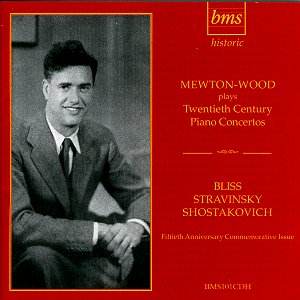Let me first declare my interest as editor of
the British Music Society Newsletter.
With this extremely generously-filled disc the
British Music Society label makes its first foray into the increasingly
crowded historic stakes. It comes at full price and in the case
of the Bliss concerto it enters a crowded field. The war-time
recording by Solomon is on Naxos at bargain price. There is a
medium price issue of the Trevor Barnard recording on Divine Art
which, depending on your taste, has a fatiguing edginess to its
sound - a characteristic, I believe of the original LP recording.
There is the reputedly stormy performance in a recording of the
New York World Fair 1939 recording with Boult and Solomon (APR)
although, as expected, the recording quality is a trial. For modern
sound you can try to find the Unicorn CD which has Philip Fowke
as the soloist but this too sounded less than perfect despite
its late 1970s lineage. Peter Donohoe (who is recording the work
for the Naxos British Piano Concertos series) performs the Bliss
on 13 November 2003 with the City of Birmingham Symphony Orchestra.
The present disc is in good mono and sounds very
acceptable indeed - the best of the historical issues. All three
works are taken from LPs rather than master tapes. Some whiskery
surface ‘burble’ is in evidence but otherwise all the signs indicate
that good condition copies were used. In the Bliss, the flute
at 3.03 in the second movement sounds beautifully well. Of course
when Bliss lets blast with a tutti as at 10.03 in the first movement
the limitations of a recording made more than fifty years ago
are apparent though hardly disastrous. Goehr and Mewton-Wood conjure
silvery and romantic magic from this score better than any of
the other available commercially recorded versions. I do not see
this recommendation changing at least not until someone is able
to produce satisfactory sound from an off-air broadcast by John
Ogdon (Royal Albert Hall Proms, 2 August 1966, BBC Symphony Orchestra/Bliss).
In that version the extraordinary Ogdon plays like a man possessed
transforming this problematic Lisztian work into gold. Then again
I listen to the wonders wrought by Mewton-Wood in the reflective
episodes at 14.33 and I am in two minds. He manages to integrate
the kaleidoscope of influences (Liszt, Chaminade, Tchaikovsky)
extremely cogently and I should not forget Goehr either who elicits
flames and silver from this survivor out of time.
With the advent of an Arthur Bliss Society we
can hope for other revelations. The grand cantata The Beatitudes
has never been commercially recorded yet it is easily as visionary
a piece as Dyson's Quo Vadis. This needs to be recorded
by a strong team. The BBC tapes of Vernon Handley's studio recordings
of the Metamorphic Variations and the Violin Concerto (with
the same John Georgiadis who recorded the Moeran concerto for
Lyrita Recorded Edition LP) are in urgent need of issue. Perhaps
someone could gather together all the Carlton BBC Bliss tapes
and reissue those as well.
The Stravinsky Concerto bears the marks
of the composer's neo-classical phase - almost a Pulcinella
concerto. It opens with the austerity - almost gloom - of Purcellian
funeral music. It is given an edgily explosive reading by Mewton-Wood
and the Residentie Orchestra. Interesting to hear the overcast
Purcellian element returning in the finale. The Shostakovich
was Mewton-Wood's last commercial recording. It is eager and incendiary
but makes time for reflection during the long moonlit lento.
After the bright-eyed enthusiasm of the moderato we launch
into the allegro con brio with its ‘Tom and Jerry’ sword-play
between Mewton-Wood's piano and Harry Sevenstern's defiantly Pulcinella-like
trumpet. The two soloists fly accelerator-floored through the
breathless gaudy and braggadocio of the final pages.
The documentation for the disc is exemplary.
There are new notes by John Talbot as well as Cecil Day Lewis's
‘Elegiac Sonnet’ written in memory of Mewton-Wood. John Amis's
memoir of the pianist is typically engaging and certainly poignant.
In addition there are reprints of William Mann's entry on the
Bliss Concerto (from ‘The Concerto’ 1956) complete with nine music
exx. Edward Sackville-West's Mewton-Wood portrait is also there.
Obtaining all necessary clearances for this valuable copyright
material music have been a considerable imposition. Whoever invested
such time to achieve the end result can take pride in the extremely
thorough level of background information - personal and factual.
This generous textual context is printed in legible type - black
on white - not to be taken for granted these days. The photographic
plates are wonderfully clear and charming. I am not quite so sure
about the colours of the booklet cover with their subdued terracotta
ground and light orange lettering. It does not exactly command
the attention on the crowded shelves of the retailer.
At 79 minutes there can be no complaints about
parsimony. The notes are generous. Collectors would do well to
keep a beady eye on the BMS label. In addition to its already
splendid catalogue (the Bowen chamber disc represents the glories
of the late romantic era; similarly the disc of cello sonatas
by Foulds, Walker and Bowen) there are plans that will enthuse
the avid collector of challenging and idiosyncratic music of the
last century.
Warmly recommended then for those who collect
Bliss or pianist recordings. It nicely complements the Mewton-Wood
set issued by ABC in 1999. It is also a de rigueur acquisition
for the growing ranks of those who have been won over by Arthur
Bliss's music. Just hearing the stony brilliance of the cascade
of notes at 9.41 in the third movement of the Bliss leaves me
once again wanting to play this disc yet again. The Shostakovich
and Stravinsky concertos are rare birds and will be wanted by
those keen to experience a young and eloquently gifted pianist
rising to the peak of his considerable powers.
Rob Barnett
See also review
by Paul Shoemaker
British Music
Society
